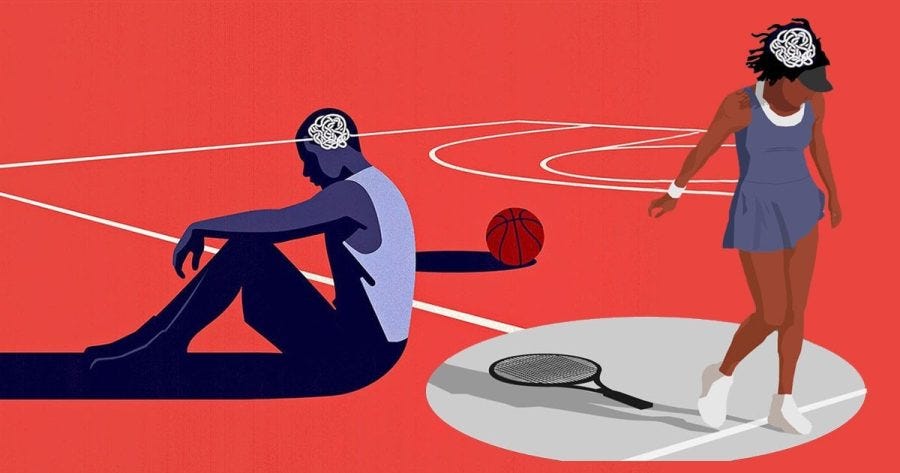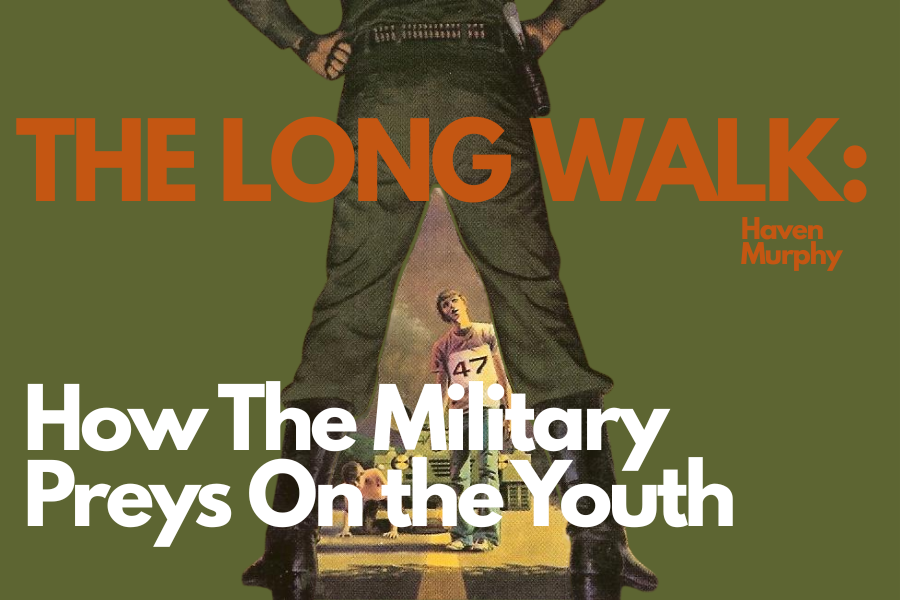On Jan. 20, 2018 Michael Phelps revealed he has struggled with suicidal thoughts and depression. On July 27, 2021 Simone Biles withdrew from the Tokyo Olympics after disclosing that she had been dealing with a case of ‘The Twisties.’ Late in the game on Sept. 11, 2024 Chicago Cubs closer Porter Hodge had an anxiety attack on the mound. These moments bring to light an important acknowledgement: even the world’s top athletes are vulnerable to the mental strain of competing at the highest level.
“I think [professional] players do feel that all the time” said South Bend Cubs Development Coach Collin Adrews. “Nobody wants to tell anybody else that they aren’t happy. No matter …[who]… you are, it does not feel good to tell somebody that you’re not happy or that you’re having problems.”
A popular saying is: “sports are 80% mental and 20% physical.” But has anyone ever actually explored the meaning of this phrase? Athletes at every level – from high school to the pros – struggle with mental health that goes beyond the scoreboard. The pressure to perform and balance school, sports, life, and just the emotional high and lows of the game all contribute to the mental toll. The phrase “sports are 80% mental and 20% physical” comes from the idea that even if athletes are fully present and prepared physically, where they are at mentally essentially determines how they perform.
The definition of good mental health can vary from athlete to athlete. How certain people handle mental health can also vary. For some, thick skin is in their nature; in the gym all the time, keeping to themselves, blocking out the noise, it’s what they’re all about. Others heavily rely on friends, family and teammates to keep them grounded and out of their head. While internal strength is important, it is equally important to recognize when external support is needed. Athletes can’t always carry the weight alone, and getting help is not a sign of weakness but proof that they are strong.
For those unfamiliar with or interested in learning from this article, some examples of challenges athletes face include dealing with performance anxiety or the fear of not performing to others’ standards, managing pressure from coaches and teammates, overcoming setbacks (physical and mental) and balancing the demands of the ‘triple threat’ (sports, personal life, and academics). After speaking with John Adams baseball and basketball player Garrett Miller about the triple threat, he explains what he thinks is most important for a student athlete to prioritize: “Be organized and create good habits early in life, in and out of sports, it will help so much.” Now, knowing these challenges is one thing, but understanding how they affect the athletes and how they deal with them is another.
Beginning with performance anxiety, the biggest aspect of this is the reality that a person is their own worst critic. As stated by Collin Andrews in an interview, “I think the biggest mental hurdle… [players] face is that there is so much expectation, from other people and yourself.”
This kind of criticism often results in excessive worry about making mistakes or not living up to expectations. Therefore leading to a fear of failure. This form of anxiety can be debilitating. Athletes may replay past performances in their minds, focusing on what went wrong rather than recognizing their achievements. This kind of negative self-talk can totally kill an athlete’s confidence and create a cycle where worrying about messing up makes them mess up even more. But there are ways to manage this anxiety! Techniques like positive self-talk, staying present and talking to trusted friends and family can help athletes change fear to confidence, letting them perform their best when it really matters.
Overcoming setbacks, both mental and physical, is a big part of an athlete’s journey. Whether it’s a competition slump, injury or personal challenge, athletes often face obstacles that test their strength. When asked about how much of sports is mental versus physical, Andrews said, “Just picture the coolest things you’ve ever done, the greatest thing you’ve ever achieved, whether it be academically or athletically… What were you thinking when you were doing that? The answer, 100% of the time, is you weren’t thinking. You were practiced, you were prepared, you knew what to do when the actual event happened. That is why almost more than 80% of the game is mental.” The ability to come back from these things requires not only physical recovery but also mental strength.
Developing a strong mindset allows athletes to stay focused on their goals, learn from their mistakes and maintain confidence even when faced with difficulties. Strategies such as setting multiple small goals needed to accomplish larger goals, practicing mindfulness and seeking support from coaches or teammates can help athletes get through these challenges and come back stronger. As mentioned previously Team USA star female gymnast, Simone Biles, pulled out of the 2020 Olympics due to mental struggle. Biles withdrew for her health and was immediately scrutinized for it. Despite the backlash she received, after some much needed time off to regroup, Simone returned to the olympic gymnastics scene this year in Paris securing three gold medals in the all-around, team and vault.
Balancing the demands of sports while managing the rest of life can be one of the biggest challenges an athlete can face, especially as the competition level increases. Bluffton University basketball player Brendan Williams (class of 2026) describes the best solution to successfully dealing with the triple threat is to “stay organized and prioritize my tasks.” Williams also mentions the fact that there will be days that will be overwhelming but if you keep on the grind, you’ll make it through. When someone is watching a game, whether it be baseball, rugby, tennis, whatever, they don’t see what’s happening behind the scenes. All they see is a player playing at their peak, but what’s often hidden are the mental and emotional notions these athletes are undergoing in and outside of sports. “When it’s not your superpower to be mentally tough, go and reach out because there IS somebody that you know… and they can help you. And if they can’t help you, they probably know somebody who can.” This is Collin Andrews’ advice to athletes that are struggling mentally but feel like they have to ‘tough it out’.
Garrett Miller was asked if he thinks enough is being done to support athletes’ mental health at the high school level, “I believe that the mental health of a student-athlete has a lot to do with the culture of the program.” Miller goes on to explain how having a healthy relationship with coaches and teammates is crucial to helping the athlete thrive. Bluffton’s Brendan Williams feels as though the support of athletes’ mental health in college is there but not emphasized enough. “There is more awareness about athletes’ mental health now, but it’s often overlooked. There could be more resources and support systems in place at the college level, especially for smaller level schools.” Williams acknowledges that while the conversation around mental health in college athletics is improving, there is still much work to be done.
As for the support at the pro level, Collin Andrews says that it gets better every year. Andrews describes how the reason it seems that athletic staff focus more on the physical side of sports is simply because they typically don’t know what goes on ‘between the ears’. Similar to Miller’s response, Collin also highlights the fact that athlete support starts with the relationship said athlete has with his/her peers and coaches.
Social media, TikTok, Instagram, Snapchat, all of it, it’s a part of us now. It’s how news is shared and received, it’s how people communicate, but most importantly, it’s how validation is obtained. Social media has become the norm for where to go to find out if one is good enough or not. Not just in sports but in general. To be honest, this can be extremely dangerous. Bottom line is: when it comes to not letting the noise or opinions of others affect you, you just have to focus on YOUR goals and focus on proving them wrong. In the words of Brendan Williams, “…tune out everyone and be YOU. OUTWORK EVERYONE.”
After having conversations with high school, college and professional athletes, it’s clear that while physical preparation is key to performing well in any given sport, the real challenge often is in maintaining good mental health. “Another piece of advice is to never go through anything alone. Teammates, coaches, trusted adults… are there for you. If somebody truly cares about you… they will be there to help in your highs and lows.” This quote comes from Garrett Miller on his advice on how to handle your mental struggles. Whether it’s dealing with the pressure of competing, overcoming injuries or staying motivated during rough practices, it is constantly emphasized in the sports world how important mental toughness is. They often suggest techniques such as mindfulness and positive self-talk to stay focused in the face of struggle. Some have no problem bouncing back from obstacles, while others find it more difficult, requiring additional support to regain their confidence and composure.










Armando Subia • Oct 9, 2024 at 9:43 pm
Excellent article! Often times we cannot be in someone else’s head and especially in sports, as a fan, we are watching the game and not the behind the scenes. Thank you for the insight!
Emily Clark • Oct 8, 2024 at 8:49 pm
Really great article, Ari! I can tell how passionate you are about this topic. Keep it up!
Cole Cleveland • Oct 7, 2024 at 9:55 am
great overall article! glad more people are exploring the mental health aspect within sports and competition! great writing!